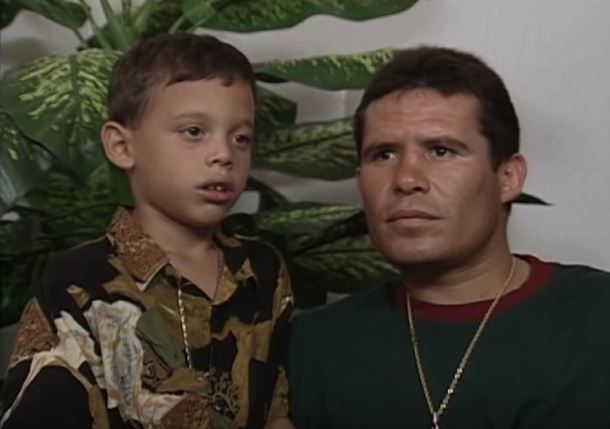By Gabriel Rodriguez
My grandpa was a fight fan. Before we had cable, he would put on a thin jacket and his LA Dodger blue baseball cap before heading out to the nearest bar that had the Julio Cesar Chavez fight.
My uncle Hugo would go with him sometimes. When they got back, I’d be on the sofa sleeping, Hugo would wake me up as he set up the other sofa to sleep on. I’d ask him who won, and he’d always reply “Chavez.” Every f##king time.
As I got older, Hugo and I shared a bedroom instead of the living room. We even got cable, and eventually a box in every room. Hugo and I would watch pro-wrestling WWF Monday Night Raw and WCW Nitro interchangeably. We even discovered how to get scribbly PPV’s for free. Jim Ross’s colorful commentary did more than just fill in the gaps left by the static on the screen, he sucked us into the story and action. My grandpa wouldn’t watch though, “It’s fake,” he’d say and go back to the living room. No one else in the family understood why Hugo and I watched pro-wrestling. They thought Lucha Libre AAA was fun since it was more acrobatic, and everyone enjoyed a movie marathon featuring “El Hijo del Santo.” Still, American pro-wrestling wasn’t their thing.
Boxing was another story though. The crowning jewel of 90’s piracy, a black box, befell on La Habra California. Now the fights came in clear (WWF pay per-views too). Suddenly, Saturday nights were devoted to Mike Tyson, Oscar De La Hoya, Fernando Vargas, Roy Jones Jr., and Tito Trinidad (Sundays to Stone Cold Steve Austin, HBK Shawn Micheals, and The Undertaker).
When there was a Mexican fight, we all watched. As a kid I remember the excitement in the air as we all cleaned up the house to get it ready for guests. My uncles and aunts would come over, and occasionally a few friends from work too. I’d argue with Hugo about how the fight would go. My grandpa would routinely check in and see if the event had started. My grandma always downplayed how good the Mexican boxer was in order not to get her hopes up. My mom and aunts would start getting nervous and pray for our fighter to win.

Once the fight finally started the excitement was palpable. Everyone sat around the TV, the youngest of us had to sit on the ground, but it didn’t matter. I was just so happy to be there. All the adults watched eagerly, reacting to every blow with cheers and shouts. When the Mexican fighter was hit my aunt Ivonne would cover her eyes in fear. My mom would yell at the opponent to stop it and call him names, careful not to curse as she was a good Catholic woman. “Malo! Feo!”
I remember the respect these men on the TV got. How they seemed larger than life. How they would radiate confidence. How they would dig deep and charge into the fire without a trace of fear. They were everything my pudgy 10-year-old self wasn’t.
But mostly, I remember how my grandpa watched the fights. How calculating he looked as he observed every movement, every step and punch so carefully. I remember how much he admired these guys, and how proud he’d look when the Mexican won. I remember how objective he was too. How his bias never really got the better of him when watching; while everyone would look for excuses if the Mexican lost, he’d shrug and say “asi es.” His reverence for the sport was infectious, and it has stayed with me since. It is the one thing he really left me after he passed, it is the one thing that always brings me back to him. I am a fight fan today because mi abuelito was one first.